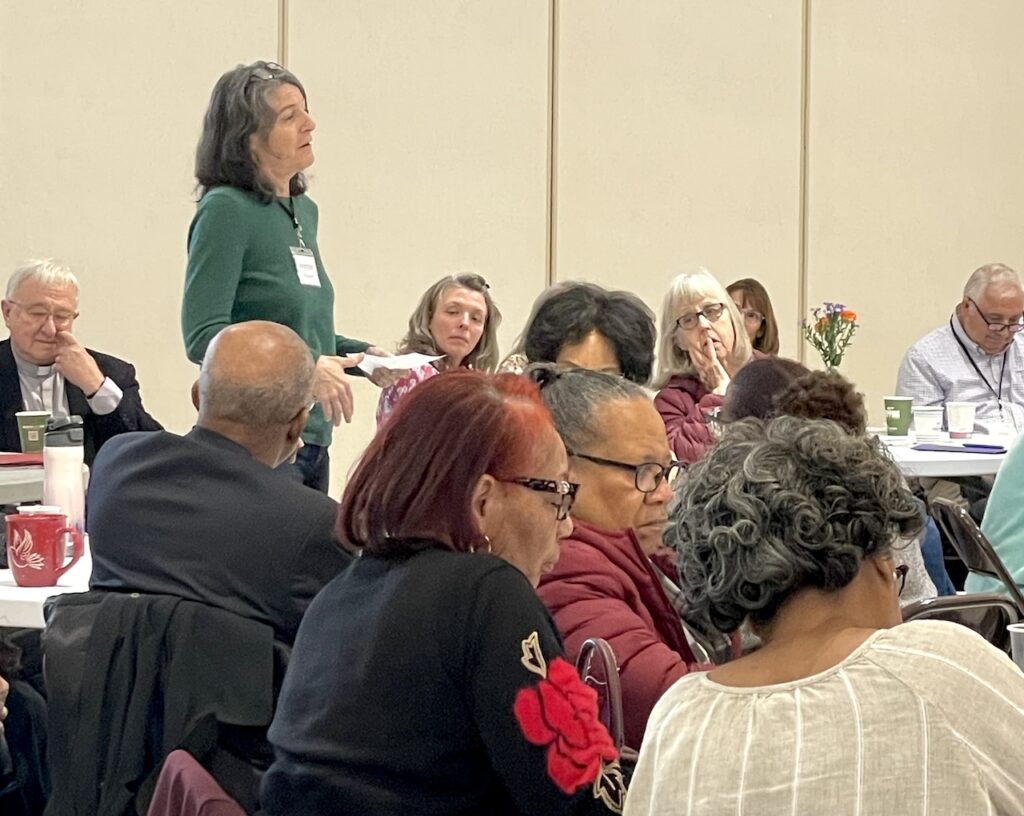In his keynote speech at the Shine Conference, Father Tochi Iwuji, director of the diocesan Office for Black Catholics and pastor of Holy Rosary, Richmond, reflected on the story of Jesus meeting the Samaritan woman at the well.
“I used the story of the Samaritan woman to establish how Christ encounters us,” said Father Tochi. “It’s an example of the validity of individual experience and meeting people where they are.”
The conference, which took place Saturday, March 2, at Church of the Redeemer, Mechanicsville, was a gathering for those doing the work of social ministry in the diocese and striving to live out Catholic social teaching. Around 80 traveled from Virginia Beach, Hampton, Roanoke and Richmond, including those already involved in social programs and those wanting to learn more. Bishop Barry C. Knestout celebrated Mass in the morning and stayed for Father Tochi’s address.
“It was a diverse group of people, and they came [to the conference] receptive,” said Tina Wandersee, director of the diocesan

Office of Social Ministries, which organized the conference.
It was the first iteration of the conference to be held since the outbreak of the COVID-19 pandemic in 2020, but Wandersee said that she hopes the conference will continue to be held annually, as it was in the past.
To set the tone for the rest of the day, Father Tochi asked participants to reflect on four questions: “What do I need to know? What do I need to be? What do I need to do? And who needs to join in the process of ministry?”
For Bridget Farmer, who was at the conference supporting the Office of Social Ministries, the quote from Father Tochi that spoke to her the most was, “Acknowledge people for who they are, not what you think they are.”
“People are not defined by their mistakes,” said Farmer. “Whatever brought someone to a point that they need help, we need to be able to help without judgment.”
‘Love is an action verb’
After breakfast, attendees had the option to attend four breakout sessions. Wandersee and Father Tochi each discussed the spirituality of ministry, while Jimmy Culpepper and Dan Kearns spoke about specific social ministry programs.
Culpepper, co-chair of the Virginia chapter of Catholic Relief Services (CRS), shared general information about CRS and then spoke specifically about the Rice Bowl program.
Each year during Lent, CRS asks for donations for the Rice Bowl program. Founded in 1975, the program has raised over $250 million in humanitarian aid since its inception. CRS has boots on the ground in more than 130 countries; 75% of donations go overseas, while 25% of donations stay within the diocese.
“It’s a way to take the Lenten practice of almsgiving and prayer and put it into practice,” said Culpepper. “Love is an action verb.”
Culpepper said that over two dozen people attended his session, and 12 signed the information sheet to learn more about the Virginia chapter. One of these attendees was Kathy Dowdy, a parishioner at Holy Family, Virginia Beach, and chair of the Haiti Education Support Team (HEST) fund.
“We have seen the results of their work in Haiti,” said Dowdy, “but I was so impressed with what they do all over the world.”
After lunch, Culpepper and Dowdy were among those who attended Father Tochi’s breakout session on racial healing.
“Race is something a lot of folks aren’t comfortable talking about,” said Culpepper, who serves on the leadership council of Virginia Catholics for Racial Justice, “but Father Tochi approached it from a Biblical and spiritual perspective.”
Since becoming director of the diocese’s Office for Black Catholics, one of Father Tochi’s projects has been the development of a workshop for racial healing. At the Shine Conference, he introduced this workshop, “Discussing Racism with Synodal Tools,” for the first time.
Father Tochi gave a short talk of his own, then opened the floor for discussion. Though he helped guide the session, it was primarily a conversation between participants.
“I was struck by his hopefulness, and his overarching theme was that if we work together, things will improve,” said Diane Atkins, minister of Outreach and Pastoral Care at Church of the Redeemer.
“Synodal principles help us in dealing with the disease of racism,” said Father Tochi. “How can you go on mission when you feel superior to people who were created in the image of God?”
Father Tochi added that parishes interested in participating in the workshop can contact him to schedule an event.
“There were no bars on what we talked about,” said Dowdy. “He made us think. When I was talking to him afterward, I said, ‘Please, come speak at Holy Family.’”
Meanwhile, Dan Kearns, executive director for the Richmond branch of the Society of St. Vincent de Paul (SVDP), was introducing his organization’s latest program, Immersion Prison Ministry, which he hopes will launch later this year.
“SVDP works with the poor. We go and visit them in their homes when they call and help with basic needs. That’s what we’ve been doing in the diocese for seven years,” Kearns explained. “This program will specifically focus on people getting out of prisons.”
The same program is operational in five other SVDP locations nationwide, and in Virginia, there are prison ministries to help those inside prisons get the help they need. The new program will take the framework of the existing SVDP program, bring it to our diocese, and work with those already in prison ministry to create an uninterrupted chain of support.
Wandersee said that this is a critical need because people who have been relying on support inside prisons are not able to access that support once they leave. “You have to have a separate team,” she explained.
“The first 72 hours after someone is released from prison is critical,” said Kearns. “We want to make sure these people have a plan laid out for them, from transportation to employment to housing.”
“More than 60% of people released from prison re-offend within three years,” added Kearns. “Obviously, we’re trying to stop that.”
Social ministry an ‘experience of God’
Wandersee said that, in her breakout session, she discussed how interactions in social ministry are truly encounters with God.
“When someone comes to us in need, that’s really a sacred space,” said Wandersee.
“The encounter is for both people,” she continued. “We have an experience of God and God’s will for the world, expressed in the world, through others and through creation.”
“Ministering to people on the margins of society or in crisis situations can be exhausting,” said Jennifer Bousquet, director of social ministry at St. Edward, Richmond. “It’s important that we intentionally nurture our spiritual life so that we don’t lose sight of why we do this.”
In his concluding remarks, Father Tochi retold the story of the disciples on the road to Emmaus. As Christians, he said, we sometimes envision life as a long road towards God, who will meet us at the end. But social ministry – like the story of Christ on the road to Emmaus – shows us that God is walking with us along the way, too.
“He is with us, going with us, helping us, understanding the realities that come with our mission,” said Father Tochi.
“God is very much alive and present to us. He is incarnate in our lives,” said Wandersee. “Are we aware of the experiences we’re having?”
“[The disciples on the road to Emmaus] are very much like us,” she added. “We’re talking to people, we’ve got things on our mind, and before you know it, the conversation has ended. Then we think to ourselves, ‘I just saw Christ.’”

